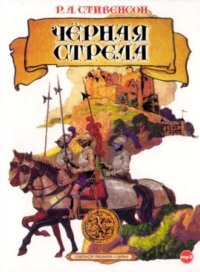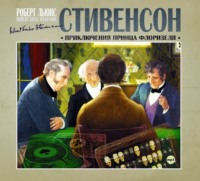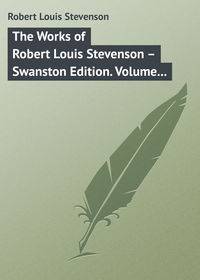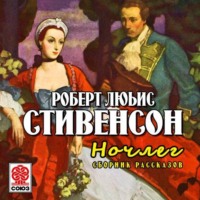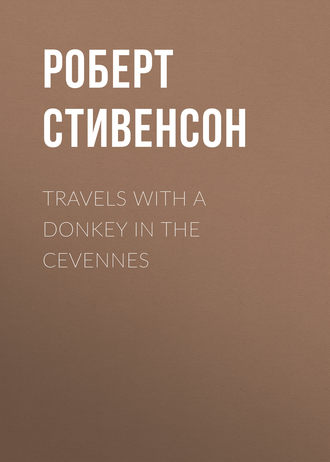 полная версия
полная версияTravels with a Donkey in the Cevennes
The whet administered, I was left alone for a little in the monastery garden. This is no more than the main court, laid out in sandy paths and beds of parti-coloured dahlias, and with a fountain and a black statue of the Virgin in the centre. The buildings stand around it four-square, bleak, as yet unseasoned by the years and weather, and with no other features than a belfry and a pair of slated gables. Brothers in white, brothers in brown, passed silently along the sanded alleys; and when I first came out, three hooded monks were kneeling on the terrace at their prayers. A naked hill commands the monastery upon one side, and the wood commands it on the other. It lies exposed to wind; the snow falls off and on from October to May, and sometimes lies six weeks on end; but if they stood in Eden, with a climate like heaven’s, the buildings themselves would offer the same wintry and cheerless aspect; and for my part, on this wild September day, before I was called to dinner, I felt chilly in and out.
When I had eaten well and heartily, Brother Ambrose, a hearty conversible Frenchman (for all those who wait on strangers have the liberty to speak), led me to a little room in that part of the building which is set apart for MM. les retraitants. It was clean and whitewashed, and furnished with strict necessaries, a crucifix, a bust of the late Pope, the Imitation in French, a book of religious meditations, and the Life of Elizabeth Seton, evangelist, it would appear, of North America and of New England in particular. As far as my experience goes, there is a fair field for some more evangelisation in these quarters; but think of Cotton Mather! I should like to give him a reading of this little work in heaven, where I hope he dwells; but perhaps he knows all that already, and much more; and perhaps he and Mrs. Seton are the dearest friends, and gladly unite their voices in the everlasting psalm. Over the table, to conclude the inventory of the room, hung a set of regulations for MM. les retraitants: what services they should attend, when they were to tell their beads or meditate, and when they were to rise and go to rest. At the foot was a notable N.B.: ‘Le temps libre est employé à l’examen de conscience, à la confession, à faire de bonnes résolutions, etc.’ To make good resolutions, indeed! You might talk as fruitfully of making the hair grow on your head.
I had scarce explored my niche when Brother Ambrose returned. An English boarder, it appeared, would like to speak with me. I professed my willingness, and the friar ushered in a fresh, young, little Irishman of fifty, a deacon of the Church, arrayed in strict canonicals, and wearing on his head what, in default of knowledge, I can only call the ecclesiastical shako. He had lived seven years in retreat at a convent of nuns in Belgium, and now five at Our Lady of the Snows; he never saw an English newspaper; he spoke French imperfectly, and had he spoken it like a native, there was not much chance of conversation where he dwelt. With this, he was a man eminently sociable, greedy of news, and simple-minded like a child. If I was pleased to have a guide about the monastery, he was no less delighted to see an English face and hear an English tongue.
He showed me his own room, where he passed his time among breviaries, Hebrew Bibles, and the Waverley Novels. Thence he led me to the cloisters, into the chapter-house, through the vestry, where the brothers’ gowns and broad straw hats were hanging up, each with his religious name upon a board – names full of legendary suavity and interest, such as Basil, Hilarion, Raphael, or Pacifique; into the library, where were all the works of Veuillot and Chateaubriand, and the Odes et Ballades, if you please, and even Molière, to say nothing of innumerable fathers and a great variety of local and general historians. Thence my good Irishman took me round the workshops, where brothers bake bread, and make cartwheels, and take photographs; where one superintends a collection of curiosities, and another a gallery of rabbits. For in a Trappist monastery each monk has an occupation of his own choice, apart from his religious duties and the general labours of the house. Each must sing in the choir, if he has a voice and ear, and join in the haymaking if he has a hand to stir; but in his private hours, although he must be occupied, he may be occupied on what he likes. Thus I was told that one brother was engaged with literature; while Father Apollinaris busies himself in making roads, and the Abbot employs himself in binding books. It is not so long since this Abbot was consecrated, by the way; and on that occasion, by a special grace, his mother was permitted to enter the chapel and witness the ceremony of consecration. A proud day for her to have a son a mitred abbot; it makes you glad to think they let her in.
In all these journeyings to and fro, many silent fathers and brethren fell in our way. Usually they paid no more regard to our passage than if we had been a cloud; but sometimes the good deacon had a permission to ask of them, and it was granted by a peculiar movement of the hands, almost like that of a dog’s paws in swimming, or refused by the usual negative signs, and in either case with lowered eyelids and a certain air of contrition, as of a man who was steering very close to evil.
The monks, by special grace of their Abbot, were still taking two meals a day; but it was already time for their grand fast, which begins somewhere in September and lasts till Easter, and during which they eat but once in the twenty-four hours, and that at two in the afternoon, twelve hours after they have begun the toil and vigil of the day. Their meals are scanty, but even of these they eat sparingly; and though each is allowed a small carafe of wine, many refrain from this indulgence. Without doubt, the most of mankind grossly overeat themselves; our meals serve not only for support, but as a hearty and natural diversion from the labour of life. Yet, though excess may be hurtful, I should have thought this Trappist regimen defective. And I am astonished, as I look back, at the freshness of face and cheerfulness of manner of all whom I beheld. A happier nor a healthier company I should scarce suppose that I have ever seen. As a matter of fact, on this bleak upland, and with the incessant occupation of the monks, life is of an uncertain tenure, and death no infrequent visitor, at Our Lady of the Snows. This, at least, was what was told me. But if they die easily, they must live healthily in the meantime, for they seemed all firm of flesh and high in colour; and the only morbid sign that I could observe, an unusual brilliancy of eye, was one that served rather to increase the general impression of vivacity and strength.
Those with whom I spoke were singularly sweet-tempered, with what I can only call a holy cheerfulness in air and conversation. There is a note, in the direction to visitors, telling them not to be offended at the curt speech of those who wait upon them, since it is proper to monks to speak little. The note might have been spared; to a man the hospitallers were all brimming with innocent talk, and, in my experience of the monastery, it was easier to begin than to break off a conversation. With the exception of Father Michael, who was a man of the world, they showed themselves full of kind and healthy interest in all sorts of subjects – in politics, in voyages, in my sleeping-sack – and not without a certain pleasure in the sound of their own voices.
As for those who are restricted to silence, I can only wonder how they bear their solemn and cheerless isolation. And yet, apart from any view of mortification, I can see a certain policy, not only in the exclusion of women, but in this vow of silence. I have had some experience of lay phalansteries, of an artistic, not to say a bacchanalian character; and seen more than one association easily formed and yet more easily dispersed. With a Cistercian rule, perhaps they might have lasted longer. In the neighbourhood of women it is but a touch-and-go association that can be formed among defenceless men; the stronger electricity is sure to triumph; the dreams of boyhood, the schemes of youth, are abandoned after an interview of ten minutes, and the arts and sciences, and professional male jollity, deserted at once for two sweet eyes and a caressing accent. And next after this, the tongue is the great divider.
I am almost ashamed to pursue this worldly criticism of a religious rule; but there is yet another point in which the Trappist order appeals to me as a model of wisdom. By two in the morning the clapper goes upon the bell, and so on, hour by hour, and sometimes quarter by quarter, till eight, the hour of rest; so infinitesimally is the day divided among different occupations. The man who keeps rabbits, for example, hurries from his hutches to the chapel, the chapter-room, or the refectory, all day long: every hour he has an office to sing, a duty to perform; from two, when he rises in the dark, till eight, when he returns to receive the comfortable gift of sleep, he is upon his feet and occupied with manifold and changing business. I know many persons, worth several thousands in the year, who are not so fortunate in the disposal of their lives. Into how many houses would not the note of the monastery bell, dividing the day into manageable portions, bring peace of mind and healthful activity of body! We speak of hardships, but the true hardship is to be a dull fool, and permitted to mismanage life in our own dull and foolish manner.
From this point of view, we may perhaps better understand the monk’s existence. A long novitiate and every proof of constancy of mind and strength of body is required before admission to the order; but I could not find that many were discouraged. In the photographer’s studio, which figures so strangely among the outbuildings, my eye was attracted by the portrait of a young fellow in the uniform of a private of foot. This was one of the novices, who came of the age for service, and marched and drilled and mounted guard for the proper time among the garrison of Algiers. Here was a man who had surely seen both sides of life before deciding; yet as soon as he was set free from service he returned to finish his novitiate.
This austere rule entitles a man to heaven as by right. When the Trappist sickens, he quits not his habit; he lies in the bed of death as he has prayed and laboured in his frugal and silent existence; and when the Liberator comes, at the very moment, even before they have carried him in his robe to lie his little last in the chapel among continual chantings, joy-bells break forth, as if for a marriage, from the slated belfry, and proclaim throughout the neighbourhood that another soul has gone to God.
At night, under the conduct of my kind Irishman, I took my place in the gallery to hear compline and Salve Regina, with which the Cistercians bring every day to a conclusion. There were none of those circumstances which strike the Protestant as childish or as tawdry in the public offices of Rome. A stern simplicity, heightened by the romance of the surroundings, spoke directly to the heart. I recall the whitewashed chapel, the hooded figures in the choir, the lights alternately occluded and revealed, the strong manly singing, the silence that ensued, the sight of cowled heads bowed in prayer, and then the clear trenchant beating of the bell, breaking in to show that the last office was over and the hour of sleep had come; and when I remember, I am not surprised that I made my escape into the court with somewhat whirling fancies, and stood like a man bewildered in the windy starry night.
But I was weary; and when I had quieted my spirits with Elizabeth Seton’s memoirs – a dull work – the cold and the raving of the wind among the pines (for my room was on that side of the monastery which adjoins the woods) disposed me readily to slumber. I was wakened at black midnight, as it seemed, though it was really two in the morning, by the first stroke upon the bell. All the brothers were then hurrying to the chapel; the dead in life, at this untimely hour, were already beginning the uncomforted labours of their day. The dead in life – there was a chill reflection. And the words of a French song came back into my memory, telling of the best of our mixed existence:
‘Que t’as de belles filles,Giroflé!Girofla!Que t’as de belles filles,L’Amour let comptera!’And I blessed God that I was free to wander, free to hope, and free to love.
THE BOARDERS
But there was another side to my residence at Our Lady of the Snows. At this late season there were not many boarders; and yet I was not alone in the public part of the monastery. This itself is hard by the gate, with a small dining-room on the ground-floor and a whole corridor of cells similar to mine upstairs. I have stupidly forgotten the board for a regular retraitant; but it was somewhere between three and five francs a day, and I think most probably the first. Chance visitors like myself might give what they chose as a free-will offering, but nothing was demanded. I may mention that when I was going away, Father Michael refused twenty francs as excessive. I explained the reasoning which led me to offer him so much; but even then, from a curious point of honour, he would not accept it with his own hand. ‘I have no right to refuse for the monastery,’ he explained, ‘but I should prefer if you would give it to one of the brothers.’
I had dined alone, because I arrived late; but at supper I found two other guests. One was a country parish priest, who had walked over that morning from the seat of his cure near Mende to enjoy four days of solitude and prayer. He was a grenadier in person, with the hale colour and circular wrinkles of a peasant; and as he complained much of how he had been impeded by his skirts upon the march, I have a vivid fancy portrait of him, striding along, upright, big-boned, with kilted cassock, through the bleak hills of Gévaudan. The other was a short, grizzling, thick-set man, from forty-five to fifty, dressed in tweed with a knitted spencer, and the red ribbon of a decoration in his button-hole. This last was a hard person to classify. He was an old soldier, who had seen service and risen to the rank of commandant; and he retained some of the brisk decisive manners of the camp. On the other hand, as soon as his resignation was accepted, he had come to Our Lady of the Snows as a boarder, and, after a brief experience of its ways, had decided to remain as a novice. Already the new life was beginning to modify his appearance; already he had acquired somewhat of the quiet and smiling air of the brethren; and he was as yet neither an officer nor a Trappist, but partook of the character of each. And certainly here was a man in an interesting nick of life. Out of the noise of cannon and trumpets, he was in the act of passing into this still country bordering on the grave, where men sleep nightly in their grave-clothes, and, like phantoms, communicate by signs.
At supper we talked politics. I make it my business, when I am in France, to preach political good-will and moderation, and to dwell on the example of Poland, much as some alarmists in England dwell on the example of Carthage. The priest and the commandant assured me of their sympathy with all I said, and made a heavy sighing over the bitterness of contemporary feeling.
‘Why, you cannot say anything to a man with which he does not absolutely agree,’ said I, ‘but he flies up at you in a temper.’
They both declared that such a state of things was antichristian.
While we were thus agreeing, what should my tongue stumble upon but a word in praise of Gambetta’s moderation. The old soldier’s countenance was instantly suffused with blood; with the palms of his hands he beat the table like a naughty child.
‘Comment, monsieur?’ he shouted. ‘Comment? Gambetta moderate? Will you dare to justify these words?’
But the priest had not forgotten the tenor of our talk. And suddenly, in the height of his fury, the old soldier found a warning look directed on his face; the absurdity of his behaviour was brought home to him in a flash; and the storm came to an abrupt end, without another word.
It was only in the morning, over our coffee (Friday, September 27th), that this couple found out I was a heretic. I suppose I had misled them by some admiring expressions as to the monastic life around us; and it was only by a point-blank question that the truth came out. I had been tolerantly used both by simple Father Apollinaris and astute Father Michael; and the good Irish deacon, when he heard of my religious weakness, had only patted me upon the shoulder and said, ‘You must be a Catholic and come to heaven.’ But I was now among a different sect of orthodox. These two men were bitter and upright and narrow, like the worst of Scotsmen, and indeed, upon my heart, I fancy they were worse. The priest snorted aloud like a battle-horse.
‘Et vous prétendez mourir dans cette espèce de croyance?’ he demanded; and there is no type used by mortal printers large enough to qualify his accent.
I humbly indicated that I had no design of changing.
But he could not away with such a monstrous attitude. ‘No, no,’ he cried; ‘you must change. You have come here, God has led you here, and you must embrace the opportunity.’
I made a slip in policy; I appealed to the family affections, though I was speaking to a priest and a soldier, two classes of men circumstantially divorced from the kind and homely ties of life.
‘Your father and mother?’ cried the priest. ‘Very well; you will convert them in their turn when you go home.’
I think I see my father’s face! I would rather tackle the Gaetulian lion in his den than embark on such an enterprise against the family theologian.
But now the hunt was up; priest and soldier were in full cry for my conversion; and the Work of the Propagation of the Faith, for which the people of Cheylard subscribed forty-eight francs ten centimes during 1877, was being gallantly pursued against myself. It was an odd but most effective proselytising. They never sought to convince me in argument, where I might have attempted some defence; but took it for granted that I was both ashamed and terrified at my position, and urged me solely on the point of time. Now, they said, when God had led me to Our Lady of the Snows, now was the appointed hour.
‘Do not be withheld by false shame,’ observed the priest, for my encouragement.
For one who feels very similarly to all sects of religion, and who has never been able, even for a moment, to weigh seriously the merit of this or that creed on the eternal side of things, however much he may see to praise or blame upon the secular and temporal side, the situation thus created was both unfair and painful. I committed my second fault in tact, and tried to plead that it was all the same thing in the end, and we were all drawing near by different sides to the same kind and undiscriminating Friend and Father. That, as it seems to lay spirits, would be the only gospel worthy of the name. But different men think differently; and this revolutionary aspiration brought down the priest with all the terrors of the law. He launched into harrowing details of hell. The damned, he said – on the authority of a little book which he had read not a week before, and which, to add conviction to conviction, he had fully intended to bring along with him in his pocket – were to occupy the same attitude through all eternity in the midst of dismal tortures. And as he thus expatiated, he grew in nobility of aspect with his enthusiasm.
As a result the pair concluded that I should seek out the Prior, since the Abbot was from home, and lay my case immediately before him.
‘C’est mon conseil comme ancien militaire,’ observed the commandant; ‘et celui de monsieur comme prêtre.’
‘Oui,’ added the curé, sententiously nodding; ‘comme ancien militaire – et comme prêtre.’
At this moment, whilst I was somewhat embarrassed how to answer, in came one of the monks, a little brown fellow, as lively as a grig, and with an Italian accent, who threw himself at once into the contention, but in a milder and more persuasive vein, as befitted one of these pleasant brethren. Look at him, he said. The rule was very hard; he would have dearly liked to stay in his own country, Italy – it was well known how beautiful it was, the beautiful Italy; but then there were no Trappists in Italy; and he had a soul to save; and here he was.
I am afraid I must be at bottom, what a cheerful Indian critic has dubbed me, ‘a faddling hedonist,’ for this description of the brother’s motives gave me somewhat of a shock. I should have preferred to think he had chosen the life for its own sake, and not for ulterior purposes; and this shows how profoundly I was out of sympathy with these good Trappists, even when I was doing my best to sympathise. But to the curé the argument seemed decisive.
‘Hear that!’ he cried. ‘And I have seen a marquis here, a marquis, a marquis’ – he repeated the holy word three times over – ‘and other persons high in society; and generals. And here, at your side, is this gentleman, who has been so many years in armies – decorated, an old warrior. And here he is, ready to dedicate himself to God.’
I was by this time so thoroughly embarrassed that I pled cold feet, and made my escape from the apartment. It was a furious windy morning, with a sky much cleared, and long and potent intervals of sunshine; and I wandered until dinner in the wild country towards the east, sorely staggered and beaten upon by the gale, but rewarded with some striking views.
At dinner the Work of the Propagation of the Faith was recommenced, and on this occasion still more distastefully to me. The priest asked me many questions as to the contemptible faith of my fathers, and received my replies with a kind of ecclesiastical titter.
‘Your sect,’ he said once; ‘for I think you will admit it would be doing it too much honour to call it a religion.’
‘As you please, monsieur,’ said I. ‘La parole est à vous.’
At length I grew annoyed beyond endurance; and although he was on his own ground and, what is more to the purpose, an old man, and so holding a claim upon my toleration, I could not avoid a protest against this uncivil usage. He was sadly discountenanced.
‘I assure you,’ he said, ‘I have no inclination to laugh in my heart. I have no other feeling but interest in your soul.’
And there ended my conversion. Honest man! he was no dangerous deceiver; but a country parson, full of zeal and faith. Long may he tread Gévaudan with his kilted skirts – a man strong to walk and strong to comfort his parishioners in death! I daresay he would beat bravely through a snowstorm where his duty called him; and it is not always the most faithful believer who makes the cunningest apostle.
UPPER GÉVAUDAN (continued)
The bed was made, the room was fit,By punctual eve the stars were lit;The air was still, the water ran;No need there was for maid or man,When we put up, my ass and I,At God’s green caravanserai.OLD PLAY.ACROSS THE GOULET
The wind fell during dinner, and the sky remained clear; so it was under better auspices that I loaded Modestine before the monastery gate. My Irish friend accompanied me so far on the way. As we came through the wood, there was Père Apollinaire hauling his barrow; and he too quitted his labours to go with me for perhaps a hundred yards, holding my hand between both of his in front of him. I parted first from one and then from the other with unfeigned regret, but yet with the glee of the traveller who shakes off the dust of one stage before hurrying forth upon another. Then Modestine and I mounted the course of the Allier, which here led us back into Gévaudan towards its sources in the forest of Mercoire. It was but an inconsiderable burn before we left its guidance. Thence, over a hill, our way lay through a naked plateau, until we reached Chasseradès at sundown.
The company in the inn kitchen that night were all men employed in survey for one of the projected railways. They were intelligent and conversible, and we decided the future of France over hot wine, until the state of the clock frightened us to rest. There were four beds in the little upstairs room; and we slept six. But I had a bed to myself, and persuaded them to leave the window open.




